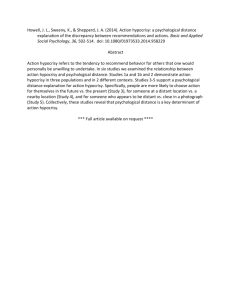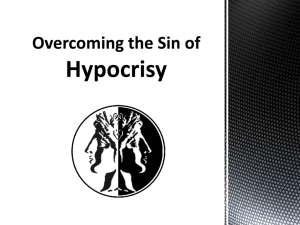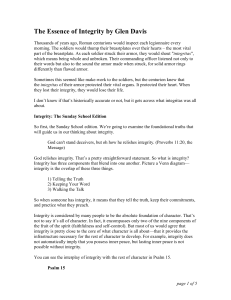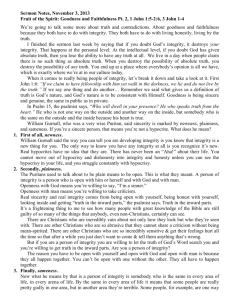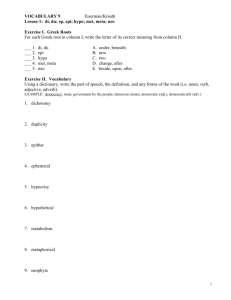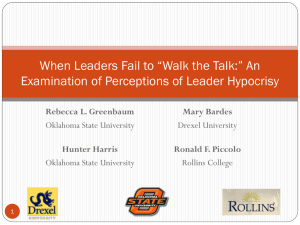What`s Wrong with Hypocrisy? - University of Colorado Boulder
advertisement
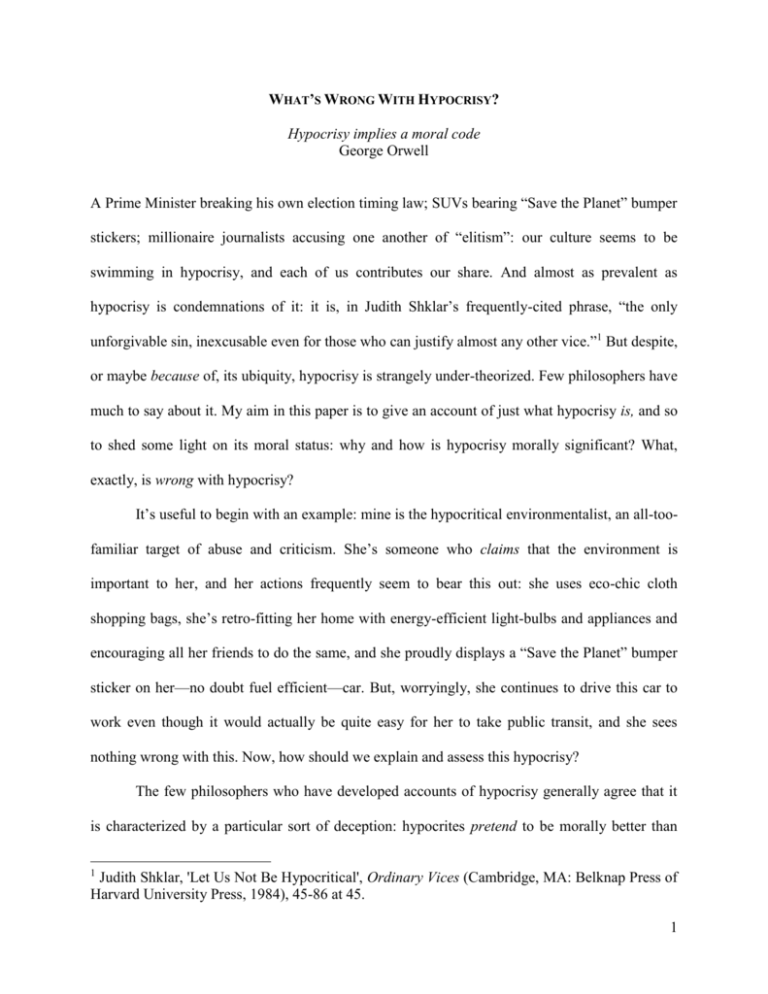
WHAT’S WRONG WITH HYPOCRISY? Hypocrisy implies a moral code George Orwell A Prime Minister breaking his own election timing law; SUVs bearing “Save the Planet” bumper stickers; millionaire journalists accusing one another of “elitism”: our culture seems to be swimming in hypocrisy, and each of us contributes our share. And almost as prevalent as hypocrisy is condemnations of it: it is, in Judith Shklar’s frequently-cited phrase, “the only unforgivable sin, inexcusable even for those who can justify almost any other vice.”1 But despite, or maybe because of, its ubiquity, hypocrisy is strangely under-theorized. Few philosophers have much to say about it. My aim in this paper is to give an account of just what hypocrisy is, and so to shed some light on its moral status: why and how is hypocrisy morally significant? What, exactly, is wrong with hypocrisy? It’s useful to begin with an example: mine is the hypocritical environmentalist, an all-toofamiliar target of abuse and criticism. She’s someone who claims that the environment is important to her, and her actions frequently seem to bear this out: she uses eco-chic cloth shopping bags, she’s retro-fitting her home with energy-efficient light-bulbs and appliances and encouraging all her friends to do the same, and she proudly displays a “Save the Planet” bumper sticker on her—no doubt fuel efficient—car. But, worryingly, she continues to drive this car to work even though it would actually be quite easy for her to take public transit, and she sees nothing wrong with this. Now, how should we explain and assess this hypocrisy? The few philosophers who have developed accounts of hypocrisy generally agree that it is characterized by a particular sort of deception: hypocrites pretend to be morally better than 1 Judith Shklar, 'Let Us Not Be Hypocritical', Ordinary Vices (Cambridge, MA: Belknap Press of Harvard University Press, 1984), 45-86 at 45. 1 they really are. On this view, our environmentalist doesn’t really think the environment is important: she just pretends to because it’s in style, or so that others will admire her. I think this deception account of hypocrisy is a complete failure. In its place, I offer a different account, one that dispenses with the emphasis on deception. On my view, hypocrites all care too much about their image for having certain values, and this excessive concern for their image leads them, in many different ways, to fail to honour the values that they claim to have. But their failure need not involve intentional interpersonal deception, though it can often involve self-deception and related failures of self-knowledge. I therefore urge that we reconsider the moral status of hypocrisy. Many hypocrites do exhibit an important moral failure, but their failures are often relatively minor, and are far from being “the only unforgiveable sin.” I. The deception account of hypocrisy According to the standard account, the hypocrite is a liar who lies about himself: he deceives others about his true beliefs, desires, intentions, and values—in short, his attitudes. Moreover, he does so intentionally, and with the aim of creating the impression of being morally better than he in fact is. This explains why hypocrisy is seen as a significant moral failure: the hypocrite is a manipulative liar (already bad enough) who wants the benefits of morality without actually being moral.2 Eva Feder Kittay says the hypocrite “pretends to be better than she is, given a norm or set of expectations within a domain in which sincerity really matters.” Eva Feder Kittay, 'On Hypocrisy', Metaphilosophy, 13: 1982, 277-89 at 277. A similar account is advanced by Bela Szbados and Eldon Soifer, who argue “it is not the pretence of self-interest alone that is crucial for hypocrisy, but rather the use of deception to gain an unmerited self-interested reward.” Bela Szabados and Eldon Soifer, Hypocrisy: Ethical Investigations (Peterborough: Broadview, 2004) at 166. Christine Mackinnon has advanced the most forceful statement of this view: the hypocrite “must intend some harm—if only that of deceiving or manipulating her fellow agents”, and she “must be aware that she is manipulating the judgments of her audience. Christine Mackinnon, 2 2 The standard example for this account is Molière’s character Tartuffe, from the play of the same name. Tartuffe pretends to be pious only so that he can take advantage of his legitimately religious host, Orgon. Tartuffe’s hypocrisy is clear-eyed: he is not at all pious, he knows that appearing pious is to his advantage, and he intentionally acts pious so as to procure that advantage. Tartuffe may be one kind of hypocrite, but he is far from the only member of the cast. In describing the hypocrite as a highly self-aware, calculating manipulator, the standard account excludes most of those we are inclined to call hypocrites, and so completely fails to capture the scope of this widespread vice; many of those we accuse of hypocrisy are neither self-aware nor calculating. Examples are not far to seek: I chose the hypocritical environmentalist because she is, at this point, a stock character in our political morality play. But I don’t think we’re inclined to call her a hypocrite because we think she is simply lying about her commitment to the environment. Her psychology is not that simple: she might genuinely believe that she is a Friend of the Earth, and still be a hypocrite for all that. The standard account cannot explain hypocrisy’s scope, because it does not give an adequately nuanced explanation of the psychology of hypocrisy. I will argue that this should lead us to re-evaluate the extent to which hypocrisy merits blame. Those who defend the deception account often try to extend its scope by appeal to selfdeception.3 Perhaps the hypocritical environmentalist deceives others about her attitudes by 'Hypocrisy, with a Note in Integrity', American Philosophical Quarterly, 28/4: 1991, 321-30 at 322-3. 3 Daniel Statman suggests that self-deception is part of an intentional strategy for the deception of others—the best hypocrites first convince themselves of what they wish to convince others. Daniel Statman, 'Hypocrisy and Self-Deception', Philosophical Psychology, 10: 1997, 57-78. Szabados and Soifer, who believe that deception is essential to hypocrisy, also appeal to self3 adopting the strategy of first deceiving herself about them. It is certainly true that many hypocrites are self-deceived, a point I will return to below. Nevertheless, self-deception cannot save the deception account. Self-deception is motivated false belief: it involves believing something that is false because one wants it to be true, and believing it despite having good reasons for believing it to be false. The hypocritical environmentalist falsely believes that she is environmentally pure because that is what she wants to be true, even though she should know that she is not. Moreover, since she is deceived about the extent to which her actions reflect her self-image, she is self-deceived about herself. The reason an appeal to self-deception cannot extent the deception account is that interpersonal deception and self-deception are not relevantly analogous: while lying is intentional, self-deception is not. While it is true that some philosophers—Donald Davidson, for example—insist that motivated false belief must be intentional, this intentionalist explanation of self-deception encounters well-know paradoxes, paradoxes that the deflationist, non-intentional account, most prominently defended by Al Mele, does not.4 And if we cannot intentionally deception in exactly this way. They argue that the appeal to self-deception explains “the existence of cases in which people are genuinely surprised to learnt that they have been hypocritical, without thereby conceding that there can be cases of hypocrisy that do not involve deception.” Szabados and Soifer, Hypocrisy: Ethical Investigations at 256. Even Christine MacKinnon, who initially presented an extremely narrow account of hypocrisy that made no room for self-deception, later modified her account to acknowledge that some hypocrites are “quite unself-conscious about the extent to which they misrepresent their real reasons for acting.” Christine Mackinnon, 'Hypocrisy and the Good of Character Possession', Dialogue, XLI: 2002, 715-39 at 719. The narrower account is found in her Mackinnon, 'Hypocrisy, with a Note in Integrity'. 4 For arguments that self-deception is not intentional, see, for example, Mark Johnston, 'SelfDeception and the Nature of Mind', in Brian Mclaughlin and A.O. Rorty (eds.), Perspectives on Self-Deception (Berkeley: University of California Press, 1988), 63-91, and Alfred Mele, SelfDeception Unmasked (Princeton: Princeton University Press, 2000). For intentionalist accounts of self-deception, see especially Donald Davidson, 'Deception and Division', Problems of 4 deceive ourselves, then self-deception cannot be part of a strategy for deceiving others. This is a serious problem, since the deception account claims that hypocrisy is wrong because it involves the selfish and unjustifiable manipulation of others. This assumes that the manipulation is intentional. Once the deception account admits that hypocrites can be self-deceived, it looses its grip on what it is that makes hypocrisy morally objectionable, since it can say nothing about the blameworthiness of self-deceived hypocrites. Rather than extending the scope of the deception account, the appeal to self-deception reveal’s the deception account’s three closely connected flaws. First, it does not properly capture hypocrisy’s scope, since it fails to account for the vast majority of those we most want to call hypocrites. This is due to a second failure, an overly simplified account of the psychology of hypocrisy—not all hypocrites are bald-faced liars. And finally, third, as a result of these failures, it gives us a mistaken account of why hypocrisy is morally troubling. My account corrects all these mistakes: by giving a more nuanced account of hypocrisy’s psychology, I both extend hypocrisy’s scope and give a better explanation of its moral import. II. Hypocrisy as misdirected concern Thought deception account fails, it begins with an important insight: hypocrites want to appear better than they actually are.5 Its mistake is to emphasize the role of lying in satisfying this Rationality (Oxford: Clarendon Press, 2004), 199-212, and David Pears, Motivated Irrationality (Oxford: Oxford University Press, 1984). Even if these apparent paradoxes in these accounts can be dispelled, a convincing account of hypocrisy should not, if possible, depend on a disputed account of self-deception. 5 As Feder Kittay puts it, the hypocrite “pretends to be better than she really is” Feder Kittay, 'On Hypocrisy', at 277; Soifer and Szabados say the hypocrite aims to gain “an unmerited selfinterested reward.” Szabados and Soifer, Hypocrisy: Ethical Investigations at 166. 5 desire. On the account I will defend, hypocrites care too much about their image as people with certain values, and this excessive concern leads them to fail, in a variety of ways, to properly honour the values they claim to hold. In a phrase: hypocrisy is a failure to ‘value one’s values’, brought on by an excessive concern for one’s image as someone with certain values.6 Though the desire to appear better than one is is an important feature of hypocrisy, there is nothing necessarily hypocritical about it: after all, there’s nothing hypocritical about a desire for self-improvement. The question is what must be added to this desire to make it hypocritical. The hypocrite’s desire is to appear to be virtuous. The problem with this desire is not that it is it is deceptive, but that it is misdirected. There is nothing hypocritical about wanting to be virtuous, but there is, as Bernard Williams points out, something “suspect” about the person whose deliberations consider whether their actions are virtuous. Kind people do kind things, but they rarely do them under that description. When the kind person acts, her reasons are considerations such as “he is in pain”, and “he needs it more than I do,” rather than “this would be kind.” To think of one’s own actions in terms of the virtues, says Williams, represents “a misdirection of the ethical attention.”7 Such ethical attention is misdirected because it primarily considers how others would describe one’s actions, rather than how one ought to act. This sort of deliberation externalizes one’s moral attention, focusing it on the wrong sorts of considerations. 6 It is worth noting that, though hypocrisy attracts a great deal of moral censure, the values at issue need not be specifically moral. One of the examples I will consider is of someone who has a hypocritical regard for aesthetic values. Feder Kittay's general definition captures this well: the hypocrite pretends to be better “given a norm given a norm or set of expectations within a domain in which sincerity really matters.” Feder Kittay, 'On Hypocrisy', at 277. On my account, hypocrisy can be a failure of practical or evaluative reason in general, rather than a specifically moral failure. 7 Bernard Williams, Ethics and the Limits of Philosophy (Cambridge, MA: Harvard University Press, 1985) at 10. This is true even though thinking of the actions of others in such terms is appropriate. 6 This definition of hypocrisy is comparative: a hypocrite’s desire for an image of virtue is stronger than his desire to actually be virtuous. It is possible to care about one’s image without being a hypocrite: Aristotle even reserves his highest praise for the magnanimous person, who cares a great deal for honour.8 And those who genuinely care about the values they profess are can still be hypocrites. The environmentalist’s hypocrisy lies in not caring about the environment enough, rather than in not caring at all. So hypocrisy does not consist simply in either self-regard or an absence of concern for one’s professed values: it consists rather in an excessive self-regard and insufficient concern for one’s professed values.9 This excess of self-regard leads hypocrites to fail, in many different ways, to properly honour the values they claim to have. What are such failures like? Tartuffe is an extreme case, since he cares nothing for the values he pretends to have: all he cares about is deceiving others for profit. Most hypocrites, however, are different. Consider, for example, Proust’s Mme de Cambremer. 10 She genuinely loves art, and thinks highly of her discriminating and independent taste. But it is also important for her own self-image that others see her a sophisticated art critic. When, upon dismissing a painting in the Louvre, she is told that Monet admires it a great deal, she quickly changes her The megalopsuchos “thinks himself worthy of great things, and is really worthy of them.” Aristotle, Nicomachean Ethics, trans. Terence Irwin (2nd edn.; Indianapolis: Hackett, 1999) at 1123b3. The magnanimous person certainly cares for his image as someone who is virtuous, but that is because he truly is virtuous, and he rightly believes that virtue is worthy of honour, “the greatest of external goods.” (1123b20) Magnanimity, says Aristotle, is “an adornment of the virtues, for it makes them greater, and does not arise without them.” (1124a1) 9 My position is in some respects similar to the one defended in Roger Crisp and Christopher Cowton, 'Hypocrisy and Moral Seriousness', American Philosophical Quarterly, 31: 1994, 3438, which characterizes hypocrisy as “a failure to take morality seriously.” But Crisp and Cowton’s account, however, does not distinguish the hypocrite from, for example, the amoralist who simply des not care about morality at all, a point that they acknowledge. And, as I shall argue below, it is possible to take morality seriously and still be a hypocrite. 10 This example was originally raised in Bela Szabados and Eldon Soifer, 'Hypocrisy, Change of Mind, and Weakness of Will: How to Do Moral Philosophy with Examples', Metaphilosophy, 30: 1999), 60-78. 8 7 opinion. Soifer and Szabados, who are interested in the difference between hypocrisy and (mere) changes of mind, argue that her change of mind is hypocritical, since she allows the views of others to influence her evaluations, even though by her own lights those views should be irrelevant, since she prides herself on having independent taste. But she may still value art: she just cares more about her image for having good taste than she does about the art itself. While some hypocrites care too much about what others think of them, not all hypocrites are concerned about their public image. For many hypocrites, it is their self-image that matters most. Our environmentalist might not care at all about what others think of her, but still care very much about being able to see herself as morally righteous. She might still be a hypocrite even if she keeps her view to herself and merely congratulates herself privately for being such a friend of the Earth. The fact that her concern is for her own self-image, and not how others see her, will influence that ways in which she fails to honour her professed values. Unlike Mme de Cambremer, she will adopt moral beliefs that she truly believe are correct, and she will adopt them because she believes them to be correct. Mme de Cambremer fails to honour the values she claims to have because she adopts her beliefs for the wrong reasons: because someone she respects has them. Our environmentalist, however, may have formed her beliefs for the best of reasons: she might genuinely believe that human activity is threatening the future of the planet, and that we have a responsibility to prevent this harm. These are legitimate reasons, apparently un-driven by a self-interested concern with her image. What, then, is the failure of practical reason that makes her a hypocrite? Ultimately, her failure is that she does not properly honour the values she claims to hold by translating those values into action. This failure can, in turn, be partly explained by self- 8 deception. The hypocritical environmentalist cares more about believing that she is eco-friendly than actually being eco-friendly, and this preference can affect the ways in which she forms her beliefs. She might, for example, be too quick to believe industry claims that bio-fuels are good for the environment, and equally too quick to dismiss scientific reports that such fuels emit just as much carbon as conventional fuels. If a less biased person would recognize that the industry claims amount to “green-washing” and the scientific reports are grounded in solid research, then our hypocrite’s excessive self-concern will have led her to form a false belief in the face of the evidence, and so she will be self-deceived.11 Her excessive concern for her own image leads to her self-deception, and this, in turn, leads directly to her hypocritical failure to properly honour the values she claims to hold. Her self-deception is a central element of her hypocrisy. Though she can truly claim that she believes protecting the environment is an important responsibility, she has not fully integrated this belief into her larger pattern of beliefs, values, judgments, and intentions. She does not recognize the sacrifices she would have to make in order to bring about her goal, and she may well be hesitant to make those sacrifices. She does not recognize the extent to which her own comfort depends in part on environmentally harmful practices. On both counts, she is too eager to criticize the moral complacency of others, and not eager enough to consider the ways in which she, too, might be morally tainted. Again, this process need not be intentional. Mele’s account of self-deception identifies many different mechanisms by which desires can lead to bias, many of which show how people “test hypothesis in ways that seem natural to them in the circumstances, and a major part of what makes their tests seem natural is relevant desire-shaped error costs.” In other words, the errors we are most concerned to avoid making can bias the ways we form our beliefs. Mele, SelfDeception Unmasked at 42. Mele argues that many cases of self-deception are the product of this sort of biased hypothesis testing, and that there need be nothing intentional about the influence of desire on hypothesis testing. 11 9 Her reluctance to consider the ways in which she may be morally tainted can be attributed to her hypocritical self-regard: it is more important for her to believe that she is genuinely virtuous than it is to actually be virtuous. She believes that she is morally clean because she has the right opinions, and does not see the need to extend these opinions into action. This hypocrite is most concerned with seeing herself as having the right values, and so she forms her evaluative beliefs in the right way: she really wants them to be correct. Her problem is that her actions do not properly reflect those values. But this leaves us with a puzzle: if she really does believe that she has an obligation to the environment, how to explain her failure to act on it? The deception account, you will recall, solves this puzzle by claiming that she does not believe it, and that she is, like Tartuffe, simply lying about what she values. But if she is not lying, how can we explain her failure to act on the values and judgements that she holds? Why is her failure not clear evidence of lying? III. Hypocrisy and failures of self-knowledge There is nothing in principle mysterious about the idea of an agent failing to act as he believes he should. Weakness of will is of philosophical interest in large part because it shows how such failures are possible. But there is an important difference between the weak-willed and hypocrites: weakness of will characteristically involves regret, since those who are weak-willed believe that that they have acted contrary to their own judgment. But most hypocrites do not know, and will even deny, that they are hypocrites. How is this lack of self-knowledge to be explained? 10 There are facts about us—including facts about our intentional attitudes—that others are in a better position to know that we are, and there are even facts about us and our attitudes that only others can know. One of the frustrating aspects of hypocrites is that the very behaviour that others recognize as evidence of hypocrisy—say, the environmentalist’s self-deceived insistence that bio-fuels are environmentally friendly—she falsely sees as evidence of her virtue. I will argue below that the hypocrite’s self-deception about empirical matters—such as the environmental effects of bio-fuels—can contribute to a deeper level of self-deception about herself. The most obvious example of counterprivacy—facts others can know about me that I cannot know about myself—is brought out by Moore’s paradox. I cannot truthfully say “I believe that it is raining, but it is not raining” since to believe that p just is to believe that p is true. But others can say of me: “he believes that p, but p is false.” After all, I surely have many false beliefs, and others can know which of my beliefs are false, even if I cannot. Thus the paradox. The lesson is that, in some cases, the third-person perspective on my attitudes is privileged over the first. Hypocrisy is another case where the third person perspective is privileged over the first: most hypocrites will genuinely not believe that they are hypocritical. This contributes to the alltoo-common phenomenon of hypocrites righteously accusing one another of hypocrisy, unaware that they are displaying the same failure for which they chastise others. The hypocrite’s failure of self-knowledge comes from falsely ascribing virtues to herself—she believes she has virtues she does not have. Some such self-ascriptions are, like Moore’s belief ascriptions, necessarily false because they are self-falsifying. As Williams points 11 out, no one who boasts of being modest can possibly be modest. 12 But not all self-ascriptions of virtue are self-falsifying: it is possible to properly describe oneself as courageous without thereby making it false that one is courageous. But even if they are not self-falsifying, selfascriptions of virtue can certainly be false. Those who ascribe virtues to themselves suggest to us that their moral attention is misdirected, since the virtue terms do not generally occur in the deliberations of genuinely virtuous agents. To confidently assert that one is generous, or courageous, for example, seems to display the kind of misdirection of concern that suggests an inconsistency with the genuine possession of virtue. Such false self-ascriptions of virtue lie at the heart of the hypocrite’s failure of self-knowledge. False self-ascriptions of virtue can happen in two ways. First, someone can falsely believe that his actions meet the standard of the virtue that he claims to have. The standards for what counts as an instance of any particular virtue are independent of an agent’s beliefs about what those standards are, and so my belief that my actions are generous does not guarantee that I am right. I might believe that occasionally giving spare change to a panhandler makes me generous, and simply be wrong about that, not knowing the sorts of actions that count as genuinely generous. Second, just as hypocrites can be wrong about whether their actions meet the standard of virtue, they can also be wrong about whether their attitudes are appropriate to virtue. If I do not truly understand the virtue of generosity, then I may believe that a self-congratulatory attitude towards my apparently generous acts is a hallmark of generosity, rather than a failure to be truly generous. Virtuous agents take as reasons considerations that non-virtuous agents fail to recognize, and so virtue involves, not simply being motivated by certain considerations, but a 12 Williams, Ethics and the Limits of Philosophy, at 10. 12 sensitivity to their status as reasons that non-virtuous people lack. This is a point that has been much emphasized in the revival of Aristotelian virtue ethics: Philippa Foot, John McDowell, for example, insist that virtue involves a species of knowledge that only virtuous people have. 13 It is therefore no surprise that those who are not virtuous can have false beliefs about the sorts of reasons for action and attitudes that are consistent with virtue. Both mistakes—about actions and attitudes—are, for the hypocrite, products of excessive self-concern. Their excessive focus on their image makes them too concerned that their actions and attitudes be understood as virtuous, and not concerned enough with how they ought to act. In primarily directing their attention to whether or not they are in fact virtuous, they focus on the wrong sorts of considerations, considerations that have no place in the deliberations of the truly virtuous. The hypocrite’s excessive self-concern therefore leads directly to false beliefs about his own virtue, and so to an important failure of self-knowledge. IV: Praise and blame for hypocrites On the deception account, hypocrites stand “twice condemned,” once for having objectionable moral views that they dare not reveal, and a second time for deceiving others about those views. In fact, some advocates of this account see one of the puzzles of hypocrisy as explaining “why the sexist … who is hypocritical is usually twice condemned” while the avowed sexist is only condemned once. 14 But they seem to simply assume that it’s true that hypocrites are even worse 13 Philippa Foot, 'Rationality and Virtue', Moral Dilemmas (Oxford: Clarendon Press, 2002), 159-74; John McDowell, 'Virtue and Reason', in Roger Crisp and Michael Slote (eds.), Virtue Ethics (Oxford: Oxford University Press, 1997), 141-62. An excellent recent version of the argument that the “should” of practical reason just is the “should” of ethical virtue can be found in Kieran Setiya, Reasons without Rationalism (Princeton: Princeton University Press, 2007). 14 Feder Kittay, 'On Hypocrisy', at 277. 13 than avowed sexists or egoists, and this assumption grounds their insistence that hypocrisy is so objectionable because of its underhanded, deceptive, manipulative nature. Even those who reject central elements of the narrow account of hypocrisy seem to accept this account of the blameworthiness of hypocrisy. They agree with the defenders of the narrow view that the wrongness of hypocrisy is closely connected to deliberate deception; they just deny that hypocrisy is always characterized by deliberate deception, and this leads them to deny that hypocrisy is a big deal, morally speaking. 15 This agreement between two otherwise opposed perspectives ignores another important possibility: hypocrisy is not essentially characterized by deception, but it is blameworthy nonetheless. Hypocrites are to be blamed for misdirecting their ethical attention by caring too much about their own image. But misdirected ethical attention is not the same as a complete lack of concern for morality, let alone adopting the goal undermining it. The hypocrite’s failure is not always a lack of sincerity or moral seriousness, but rather an excessive concern with his or her own moral assessment, and so a failure to properly direct his or her concern. 16 This failure can 15 Daniel Statman, for example, argues that, since hypocrisy is often characterized by selfdeception, and since self-deception is involuntary, we should be less quick to blame hypocrites. Statman actually equivocates about whether self-deception is intentional. He portrays selfdeception as a strategy for carrying out the interpersonal deception that he narrow deception account of hypocrisy requires, but he also counts it as involuntary, and so as deserving pity rather than blame. It is hard to see how these two positions can co-exist, since self-deception can only be a strategy if it is intentional. Daniel Statman, 'Hypocrisy and Self-Deception'. Similarly, Dan Turner rejects the association of hypocrisy with deception. He argues instead that hypocrisy is simply characterized by a disparity or conflict in values. We express values in our beliefs, our words, and our actions, and so hypocrisy requires a “disparity pair”: a belief in conflict with an action, or a pretended belief in conflict with a genuine belief. That is all hypocrisy requires— there is no reference at all to deception, let alone willful deception. Turner concludes that, since hypocrisy does not require deception, “the evil of hypocrisy is on par with the evil of logical inconsistency,” which is to say, not that evil at all. Dan Turner, 'Hypocrisy', Metaphilosophy 21: 1990), 262-69 at 266. 16 This is where the otherwise admirably nuanced account offered by Roger Crisp and Christopher Cowton goes wrong. Their account avoids the pratfalls of the deception account, but 14 take many forms: hypocrites can be complacent, failing to even consider the demands of the values they claim to have; they can be self-deceived, too quick to adopt beliefs that allow them to maintain a positive self-image; and they can overly sophistical and clever, rationalizing almost any behaviour as consistent with their values and finding almost any excuse to doubt the validity of purported ethical obligations. Each form of misdirection is blameworthy, since each represents a failure to properly engage with morality. Hypocrites fail to put in the often hard work of moral reflection, they do not face up to the real cost of their moral commitments, and so they fail to fully integrate their moral values and beliefs into a larger network of beliefs, intentions, and desires. This failure can be due to a lack of willingness to try, but it need not be. It is possible to try to get things right and still fail: moral reflection can be hard, and failures of self-knowledge and misdirected ethical attention can trip up even those whose commitment to morality is sincere. Hypocrites therefore display real moral failures, and they are certainly blameworthy for them. But though hypocrisy is blameworthy, it is far from an unforgivable sin. A hypocrite who acts well in one context but not in another need not be condemned in both. On the deception view, each apparently virtuous act by the hypocrite is really further evidence of her duplicity and another black mark on her moral record. But, having rejected the deception account, we can reject the overly harsh treatment of hypocrites along with it. The hypocritical environmentalist is certainly blameworthy for her hypocritical selfdeception: she ought to know better, and so to change her behaviour. But if, despite driving when she can take transit, she donates money to environmental causes and is also dedicated to since they connect hypocrisy to a lack of moral seriousness, they fail to see how hypocrites can be quite serious about morality, but wrong about what is morally significant. Roger Crisp and Christopher Cowton, 'Hypocrisy and Moral Seriousness'. 15 composting, recycling, and eating locally, she can also be praised for her genuine environmentalism. These are not empty gestures or part of a calculated deceptive strategy, and her environmentalism is not a mere pretence to virtue, deserving of censure. She might genuinely care about the environment; her hypocrisy consists in sometimes allowing her concern for her image to trump her commitment to her cause. Our reaction to hypocrites who fail to live up to the standards they proclaim should therefore often be “your principles are the right ones, but you can do much more to honour them,” not “you’re a manipulative, unprincipled sham.” The fact that they can and do have the right values, even if they do not fully integrate those values into their network of beliefs, desires, and intentions, means that hypocrites can be improved, can be made to see the light. Hypocrites, like the rest of us, have attitudes that are under their control: they can bring those attitudes into alignment once they gain the proper self-understanding. So bringing their hypocrisy to their attention can be an important step in developing this self-knowledge. Though they do not know that they are hypocrites, not all of them will resist the accusation: some will treat it as a discovery and be moved to self-improvement. The hypocrite’s moral blindness is often only partial. Hypocrites can be praised for the moral vision they do have, even as they are criticized for their failure to fully extend that vision. I have criticized the deception account for failing to properly capture hypocrisy’s scope. It might be objected that my account similarly fails to account for the extreme condemnation that hypocrisy receives. Such an objection would be misplaced, however. On my account, hypocrisy can be a serious vice. I simply maintain that many vices are worse, and that hypocrites do not all aim to undermine morality. Moreover, we should take many accusations of hypocrisy with a healthy dose of salt. They are often forceful not because hypocrisy really does merit the strongest 16 possible condemnation, but because many accusations are themselves exercises in hypocrisy: one of the best ways for a hypocrite to demonstrate the strength of his purported commitment to morality is to question the sincerity of someone else’s. The prevalence of widespread condemnations of hypocrisy does not mean that hypocrisy is as blameworthy as it role in the cultural conversation might lead us to believe; rather, it means that our cultural conversation itself is often highly hypocritical. 17
